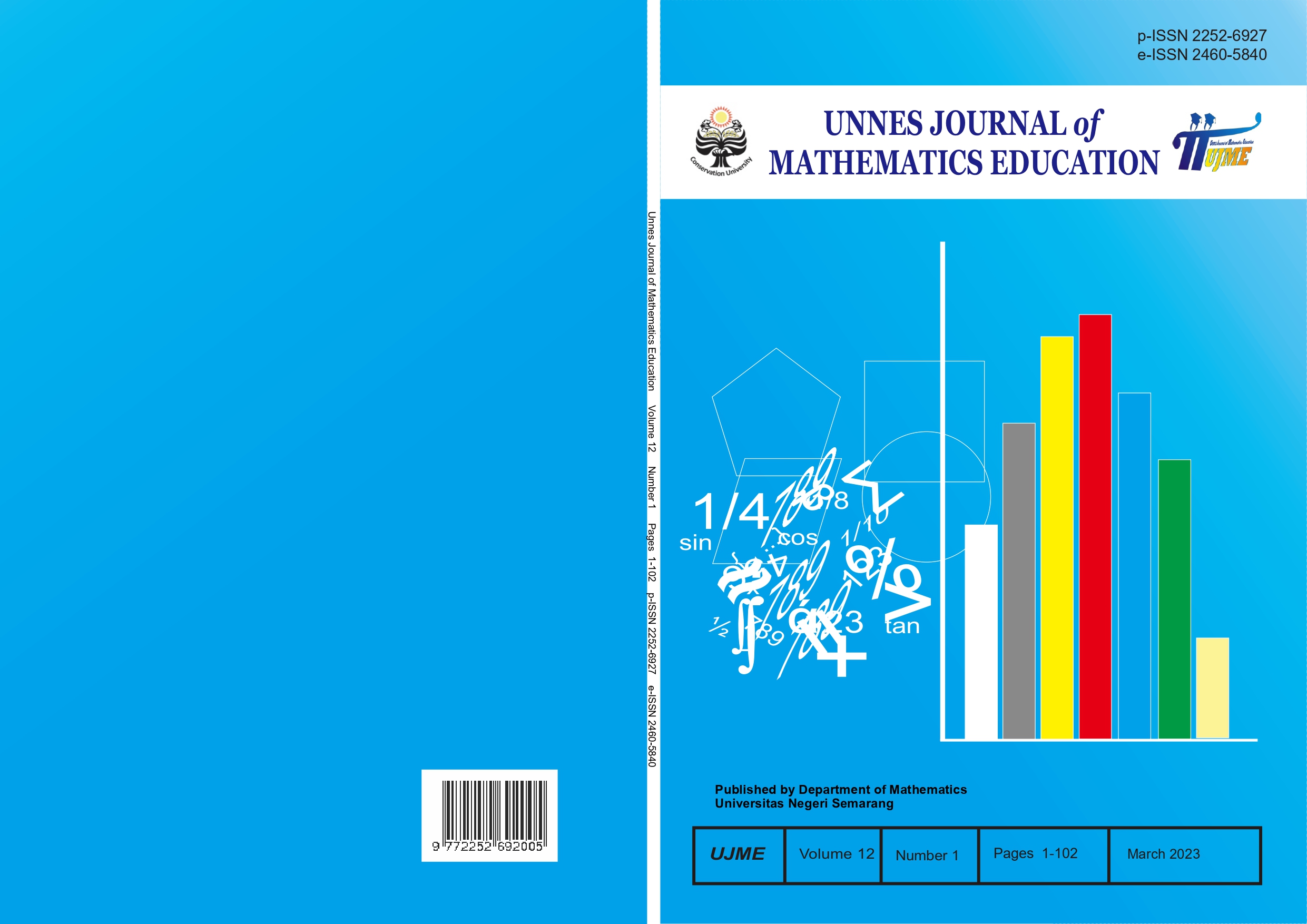Students' Mathematical Reasoning Ability Viewed from Self-Regulated Learning in the Missouri Mathematics Project Learning with Open-Ended Approach
##plugins.themes.academic_pro.article.main##
Abstract
The mathematical reasoning ability of class VIII students of SMP Negeri 1 Kedungwuni is still relatively low. The purpose of this study is to analyze and describe students' mathematical reasoning abilities in the MMP learning model with an open-ended approach in terms of students' self-regulated learning. The method used is a mixed method with an explanatory sequential design strategy. The results showed that: (1) students' mathematical reasoning abilities in the MMP learning model with an open-ended approach achieved classical mastery; (2) there is a positive influence of students' self-regulated learning on students' mathematical reasoning abilities in the MMP learning model with an open-ended approach, namely 17.1%; (3) the average mathematical reasoning ability of students in the MMP learning model with an open-ended approach is better than the average mathematical reasoning ability of students in learning with a scientific approach; (4) there are differences in students' mathematical reasoning abilities in terms of students' self-regulated learning in the MMP learning model with an open-ended approach; (5) a description of students' mathematical reasoning abilities in terms of self-regulated learning in the MMP learning model with an open-ended approach, namely (a) students with high levels of self-regulated learning are able to fulfill all indicators of mathematical reasoning abilities well; (b) students with intermediate level self-regulated learning tend to be quite capable in all indicators of mathematical reasoning ability; (c) students with a low level of self-regulated learning tend to be able to present mathematical statements, but tend not to be able to fulfill the other three stages.
##plugins.themes.academic_pro.article.details##
References
Astuty, E. S. W., Waluya, S. B., & Sugianto, S. (2019). Mathematical Reasoning Ability Based on Self Regulated Learning by Using The Learning of Reciprocal Teaching With RME Approach. Unnes Journal of Mathematics Education Research, 8(1).
Cahya, I. M., Effendi, K. N. S., & Roesdiana, L. (2021). Pengaruh Kemandirian Belajar terhadap Kemampuan Penalaran Matematis Siswa SMP. ANARGYA: Jurnal Ilmiah Pendidikan Matematika, 4(1), 62–70.
Fajriyah, L., Nugraha, Y., Akbar, P., & Bernard, M. (2019). Pengaruh kemandirian belajar siswa SMP terhadap kemampuan penalaran matematis. Journal on Education, 1(2), 288–296.
Herdiman, I. (2017). Penerapan pendekatan open-ended untuk meningkatkan penalaran matematik siswa SMP. Jurnal Edukasi Dan Sains Matematika (JES-MAT), 3(2), 195–204.
Isnaeni, S., Fajriyah, L., Risky, E. S., Purwasih, R., & Hidayat, W. (2018). Analisis kemampuan penalaran matematis dan kemandirian belajar siswa SMP pada materi persamaan garis lurus. Journal of Medives: Journal of Mathematics Education IKIP Veteran Semarang, 2(1), 107–116.
Khaerunnisa, A. (2022). Kemampuan Penalaran Matematis Ditinjau dari Kemandirian Belajar Siswa SMP. Seminar Nasional Matematika Dan Pendidikan Matematika Universitas Singaperbangsa Karawang.
Muhsin, M., Husna, H., & Raisah, P. (2020). PENERAPAN MODEL PEMBELAJARAN MISSOURI MATHEMATIC PROJECT (MMP) UNTUK MENINGKATKAN KEMANDIRIAN BELAJAR SISWA. Numeracy, 7(1), 95–108.
Munasiah, M. (2016). Pengaruh kecemasan belajar dan pemahaman konsep matematika siswa terhadap kemampuan penalaran matematika. Formatif: Jurnal Ilmiah Pendidikan MIPA, 5(3).
Nawastiti, N., Suyono, S., & Rahayu, W. (2018). Pengaruh Model Pembelajaran Accelerated Learning Terhadap Kemampuan Penalaran Matematis Siswa Ditinjau Dari Self Regulated Learning. Journal of Mathematics Learning, 1(1), 1–12.
Nurwijayanti, A., Jazuli, A., & Widyastuti, E. (2017). The description of students’ mathematical problem-solving skill and self-regulation. International Journal of Science and Applied Science: Conference Series, 2(1), 38–44.
Rivai, M. A., & Surya, E. (2017). Analisis model pembelajaran missouri mathematics project terhadap kemampuan penalaran matematika siswa SMP. Jurnal Pendidikan Matematika, 1(1), 20–31.
Wahyudi, I. D., & Walid, W. (2020). Mathematical reasoning ability of students based on learning style using Missouri Mathematics Project learning model. Unnes Journal of Mathematics Education, 9(3), 206–210.
Winardi, W., Wardono, W., & Dwijanto, D. (2018). Analisis Kemampuan Literasi Matematika Melalui Model Missouri Mathematics Project dengan Pendekatan Open-Ended. PRISMA, Prosiding Seminar Nasional Matematika, 1, 162–169.
Zannati, G. N., Fitrianna, A. Y., & Rohaeti, E. E. (2018). Pengaruh Kemandirian Belajar Terhadap Kemampuan Penalaran Matematis Siswa Smp Pada Materi Perbandingan. JPMI (Jurnal Pembelajaran Matematika Inovatif), 1(2), 107–112.
